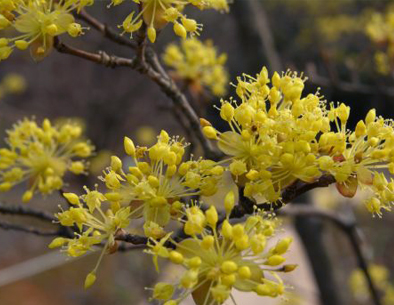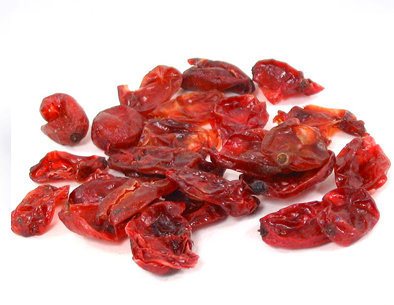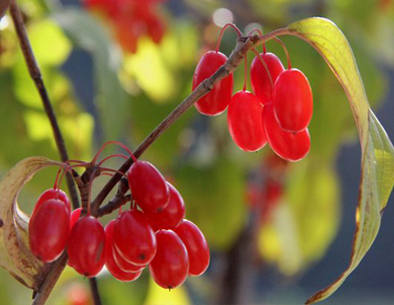Description
Details

Asiatic dogwood fruit comes from the Asiatic dogwood tree. This fruit goes by numerous other names, including Asiatic cornelian cherry fruit and, in China, shan zhu yu. The fruit provided a variety of uses in traditional Chinese herbal medicine and still appears in numerous herbal medicine texts in the 21st century. The fruit provides uses other than its medicinal applications and appears occasionally in gardens and landscape environments in the United States.
Asiatic Dogwood Fruit
Asiatic dogwood fruit constitutes the fruit of the Japanese cornel dogwood tree. The small, berry-life fruits of the Japanese cornel dogwood appear in mid-September and provide color and aesthetic value to the tree alongside its purple fall foliage. The shiny red fruit of the Asiatic dogwood tree appear in clusters and measure approximately half an inch long. These fruits prove safe to eat raw or cooked. The fruit earned its name from being Asiatic, or Asian, in origin, and of a dogwood tree. The term Asiatic dogwood, when applied to the tree itself, proves something of a generic and unhelpful name, as all dogwood trees originated in Asia.

Medicinal Uses
Asiatic dogwood fruit provided various uses in traditional Chinese medicine. Practitioners of herbal medicine used the flesh of the fruit to treat diabetes and prevent complications arising from the disease. As a drinkable tonic the fruit was used to maintain health in the liver, kidney, urinary tract and male reproductive system. Practitioners of herbal medicine use a tea made from the fruit to address impotence, incontinence, low sex drive, baldness, frequent urination, vertigo and arthritis. The fruit was also used as an anti-inflammatory agent.

Additional Information
Japanese cornel dogwood earns its name from its native range, which covers all of Japan and the southern portion of the Korean peninsula. At some point, the tree found itself introduced to China, as its fruit appears in various Chinese medicinal applications. No record of when this occurred seems to exist in the English language.
Japanese cornel dogwood appears nearly identical to related species Cornus mas, or cornelian cherry dogwood, a somewhat common landscape species in some parts of the United States. The authors of the book "Dogwoods: The Genus Cornus" make the point that Japanese cornel dogwood proves more aesthetically appealing, easier to grow and slightly smaller than Cornus mas, making it overall a more attractive species for growers.

sources : http://www.ehow.com
Advice to consumers
Some individuals may have adverse reactions to certain plants, herbs, and other natural products.
Just because something is natural does not mean it is safe for everyone.
On any issue where no specific advice is given to consumers please follow this general advice if you are currently taking the product:
you are advised to discontinue use and consult your pharmacist or herbal medical doctor.
when speaking to your doctor of pharmacist you may find it helpful to take a copy of this MHRA advice about the product with you
you should continue to take any medication prescribed by your doctor.
Additional
Additional
| Health Benefits | sexual recovery, enhanced renal physiology, enuresis, erectile dysfunction, growth vigor, impotency, kidney , male enchancer, motility of human sperm, tinnitus |
|---|---|
| Directions | Wash 20g of herb roots on running water; boil for over 2 hours depending on symptom in 2L of water. |
| Product Package | Paper sealed bag |
| Good herbal formulation | Schizandrae Fructus, Lycil Fructus, Cornus Officinalis |
| Storage Temperature | room temperature |
| Country of origin | Korea |
Reviews
FAQ
Frequently Asked Questions
A: Generally you boil 20g of tea/herb with 2L. of water. The ratio does not matter. However, it is recommended that you control the
saturation of the tea (how strong it is) depending on your personal
preference and body condition.
A: It depends on the tea/herb.
For leaves: boil for 15~20 min.
For hard fruits, roots, and stems: If you soak the tea/herb in water
for 1~2 hours before boiling, you can save time in boiling, and also
get a deeper flavor than without soaking.
A: Currently, what is listed on the site is what we mostly deal with in
retail stores. However, if there is a certain tea/herb that you wish to
get, you can send an email to info@leafnflower.com. or 844-344-0622.
Then, we may offer a price for obtaining the tea/herb, answer questions, and even offer purchase.
A: Yes, you can combine 5~10g of teas/herbs that you already have with Leafnflower.com's teas/herbs.
Although brewing one tea/herb is still good, combining 2~3 teas/herbs helps bring out
the remedial effects of the tea/herbs better than brewing just one tea/herb. However, most tea/herbs contain natural toxins,
and it is recommended that you boil 1~2 pieces of liquorice root along with the tea/herb to remove the toxin.

